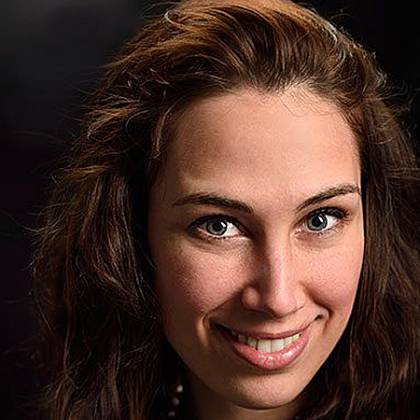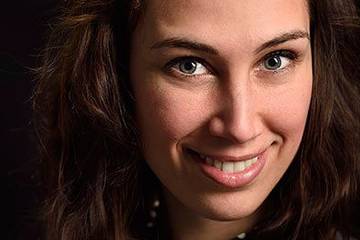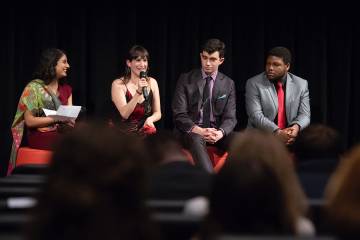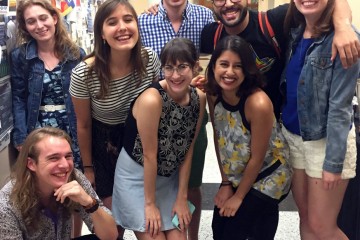Two and half months into senior lecturer Meredith Ward's tenure as director, the Johns Hopkins Program in Film and Media Studies is already bustling with activity.

Image caption: Meredith Ward
Image credit: Will Kirk / Johns Hopkins University
The 1968 on Film Series, co-presented by the program and the Stavros Niarchos Foundation Parkway Theatre, started up this week and runs every Monday through Dec. 3.
This weekend, the program will host a semester kickoff event at MICA's Fred Lazarus IV Center auditorium, featuring the silent films Cops, starring Buster Keaton, and The Immigrant, starring Charlie Chaplin, with live soundtrack played by the American Studio Orchestra.
Ward, a class of 2003 graduate of the program, has also founded the student-run production house Studio North, the Studio North/Saul Zaentz Television Writers Room, and the Johns Hopkins University High School Film Contest and Festival. And she is the faculty advisor to the Johns Hopkins Film Society, the student organization that screens films during the school year and organizes the annual Hopkins Film Festival.
The Hub caught up with Ward to talk about the program's growth; educating the next generation of media creators in a changing media landscape; and the filmmakers, writers, and producers coming to campus this year.
Tell me a little bit about the Johns Hopkins University High School Film Contest and Festival that took place in June. How and why did you develop it, and how did it go?
Part of it, first, had to do with wanting to give high school students who are very serious about their filmmaking practice an environment in which their work was recognized and honored. We overtly wanted to do that by having the event at the Parkway Theatre and having the sort of excitement surrounding that in which you're still 16, 17 years old and you're walking into this massive motion-picture palace and everyone is there to see your work.
As a part of this, we also had a very strong workshop component, and it was the workshops that the students responded positively to the most. We brought in two alums. One of them is with Luke Kelly-Clyne, who is only 30 but has gone off and become the head of development at Big Breakfast, one of the major internet media companies that produces comedic content. He gave a talk on how you navigate the industry, which is incredibly strategic, helpful, and practical.
We also had Emma Needell, whose feature film script is going into production with Oprah's production company, Harpo Studios. She came back to Hopkins and did a screenwriting workshop. We brought in these young alumni to be relatable to the high school students and to be a model, as in, this is who you could be in 12 years if you start working really hard now.
And there's the element that we want to make sure that the strongest student filmmakers in the country know that Hopkins Film and Media Studies is here, we're interested in them and, hopefully, also have them be interested in us.
When you first told me about the contest, one of the things it made me think about is that film schools and programs in America are really not that old. But young filmmakers coming up right now have different needs, desires, and wants if they're looking to get into a constantly changing professional environment.
It's always fascinating. I have an in because my husband teaches high school and I teach on the university level, so I ask him what his students are into when it comes to media: "What are your 15-year-olds watching? What are they interested in, the kids who want to be in media?" And that tiny focus group is just a peek into a much, much larger group when you're thinking about kids who are interested in going into media as their major and probably going into it for their career.
And you're absolutely right—media means something different now than it meant in 1962. Students might be interested in going into television, increasingly. They might be interested in going into what Luke's company does, which is the intersection of television and online content. So it really is different, and we're sort of acclimating to and accommodating that.
And it does affect the programming we do. This year we have a weekend-long workshop on creating a web series for that reason. We have another that's oriented toward writing comedic content for the internet. We're thinking about these other platforms that are not the traditional cinema platform that I grew up on and still love. But it isn't the only thing happening now.
As the new director, what do you have planned for the coming year, and how can the program continue its forward momentum?
We're absolutely in a moment of solidifying the program and also expanding by building on those foundations and starting a lot of new content. Part of what we're doing this year, which is a huge push, is essentially more experiential learning. That's going to happen largely by bringing in industry professionals who are going to be doing master classes and workshops and Q&As and getting a lot of face time with our students. We're going to probably have 11 visiting artists over the academic year.
In September we have Dan Mirvish, who was the co-founder of the Slamdance Film Festival and the author of The Cheerful Subversive's Guide to Independent Filmmaking. He's going to give a very practical talk about how to get your movie made without connections or money.
In early November we have Sarah Salovaara, who is a JHU alum and the creator of one of the top web series of 2017 according to IndieWire. She's going to come in and do a weekend-long workshop on how to create a web series.
Also in November we have a masterclass on cinematography and a Q&A with Bradford Young, who is the Academy Award-nominated cinematographer of Selma, Arrival, and Solo: A Star Wars Story. He lives in Baltimore as of last year.
We have a three-session workshop on television writing with Larry Doyle, who was a staff writer for The Simpsons. We have a Q&A and master class with Christine Vachon, who produced Carol, Far From Heaven, Velvet Goldmine, I'm Not There, and so many more. We have a master class on television writing with Jon Pollack, who was a staff writer for Modern Family, 30 Rock, and Community as well as an executive or consulting producer for these shows and others.
And we just got another one that I'm super excited about, Terence Nance. He made An Oversimplification of Her Beauty and now he's also doing the HBO series Random Acts of Flyness, which is so smart the way it talks about race. I like that it blows my mind, and I like that moments of it make me uncomfortable, and people should be creating more content like that, which can really foster dialogue.
And I know he's not just excited about coming to talk to film students but coming to talk to the Baltimore community. And to be honest, we're really trying to craft a diverse lineup this year, having women represented and having racial diversity and talking about matters that are integrally related to Baltimore as a city in our programming. Let's talk about race, let's have program speakers and content that are relevant to where we are. And open up these events to the broader community, not just our students. This is something that we at Hopkins can bring to a long table with many people at it. That is where the rubber meets the road.
As the program expands and grows, how are you evaluating what's working, what's missing, et cetera?
So part of this [new programming] comes from our senior exit surveys. We always ask, "What do you wish existed at Hopkins? What would you like to see for future generations after you leave?" I always take that particularly to heart because I really like to build things. I love that process of identifying a need and then building something to fulfill that unmet need. And senior surveys are part of that.
It also helps that I do a lot of student life activities. I spend the vast majority of my week with the students, and in those conversations that naturally come up they'll say, "I'm interested in this" or "I wish we had this going on." Or being at special events and hearing them say, "this is cool, if only we had more of this other thing." That's a gap that needs to be filled. A lot of these programming ideas come from that.
One of the things I'm going to be doing a lot of this year is seeking out feedback. An academic program is a living organism and it needs to adapt to continue to thrive, and if you're just throwing out ideas and not seeking feedback, you can't build. The nice thing for us right now is that everything we've always done is very strong, so we're in the position of building on as opposed to recreating. What else can we deal with given the added resources we have to have right now?
You graduated from the program in 2003. Did everything the program is doing now seem like a possibility at the time?
It was very different. It was a very different media moment. People still went to the movie theater all the time in 2003. I remember being in Shriver Hall and having it packed out with people to see The Matrix. And that remains a wounding memory in my heart now—why can't we get them to do that any more? We do try, but it's a harder sell than it once was.
We need to provide added value with speakers and filmmaker appearances to get those packed auditoriums now. I wish we didn't. I'm a cinephile. Events at the Parkway are a prime example of the great work that cinephile culture is up to now, drawing audiences in for new film experiences that are rich and diverse.
One real strength of having been a student in the program a long time ago is that I do have the memory of what I wished I could have experienced. What did I wish we had back then? After Hopkins, I went to Northwestern, which at that point had a lot more film resources than Hopkins did. So I got to see a model of what someone else was doing.
The leadership and the faculty at Film & Media Studies have always had the vision, drive, and teaching excellence that makes a top program. Linda DeLibero built a program that prepared me for the world of scholarship and prepared friends of mine for careers in the film industry. What the program needed was resources.
We now find ourselves in a new moment in the program's history. We can offer extensive new opportunities we couldn't before, and with that, our community grows. Now it's a whole new ballgame, and part of it is that we have a thriving film and media culture, and it's broad. And you can expect our community to be visible.
We're going to have merchandise for the first time this year. People are going to be walking around with "JHU Film" shirts and "JHU Film" laptop stickers. And I think we're a stronger presence on campus now than we've ever been. I love the idea that people would know us at Hopkins for film and media, and would be exited to come here for that.
And that was one of the really nice things about the high school film festival, talking with these students from California, Toronto, New Jersey, all these different places, who are excited to come to Hopkins for film. We're at a place right now where we can completely justify their enthusiasm and give them a fantastic experience.
And not just a culture, but the culture of a program that differentiates itself from others out there. There's a unique experience that you might not get somewhere else.
It's a carefully curated and crafted experience that's individual and personal but also really powerful. You can be one of 14 kids to be in a workshop with one of the best cinematographers in the world right now. All of your faculty know your name, and they'll help you get your internship and you often work with them in extracurriculars. Everyone knows everyone, even as we grow. So it's a little bit of a family atmosphere with really intense and powerful resources behind it.
Posted in Arts+Culture, Voices+Opinion
Tagged film and media studies










